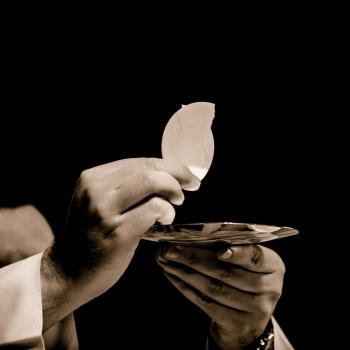My wife and I just returned from vacation in France not long ago. We had a wonderful time. We ate too well. We drank our share of wonderful wine. In addition to seeing Paris again, we also got to see Bordeaux for the first time – which helps to explain the wine. And despite the airlines’ best efforts, we have managed to hold onto the delight of getting to see another part of the world again.
That said, both of us agree, France always makes us a bit sad. Not sad in a way that would keep us from going and not sad in a way that interfered with our enjoyment — but sad because France – like many parts of the West – seems to have lost its way.
It is cut off from its spiritual heritage. It has been taught to despise its cultural heritage. And it knows less and less of its own history.
The church is also a shadow of itself. Religious language is all but absent from daily conversation. The churches are little more than artifacts and, in most cases, they are poorly maintained.
In the French way of thinking about them, their only claim to any kind of attention lies in their architectural value and even that isn’t widely acknowledged. When Notre Dame Cathedral caught fire, it was only a public outcry over the impact it would have on the city’s skyline that kept President Emmanual Macrone from adding a different spire, modern windows, and maybe a rooftop garden – arguing that it was time for the twenty-first century to make its mark.
What happens in a vacuum of this kind? The culture drifts and people begin looking for other ways of defining their purpose and their history. And usually, those definitions are of secondary and passing significance – if not altogether trivial.
Which is probably why the modern cathedral of French society is the new Louis Vuitton Hotel which will open in 2026. Shaped like a giant steamer trunk for which Vuitton was once so well known, it occupies eight addresses on the Champs Élysées and promises “6,000 square meters of unparalleled splendor”. According to the publicity, it is “not just about grandeur but also sustainability and innovation”. Forgive me for saying so, in other words it is a modern cathedral committed to a celebration of conspicuous consumption, recycled waste, and self-indulgent novelty.
The situation in France is predictable. France was founded on the conviction that society should be free from religion. If you found a country on the principle that it should be free from religious commitments, you should not be surprised when there is no religion and nothing transcendent that holds the culture together.
In our own country we are flirting with that same possibility. The United States was not founded on the principle that we should be free from religion. It was founded on the principle of freedom for religion. And those two pronouns are very important and very different.
But in today’s volatile, polarized condition we may yet get to the same place where France is. In part because some fail to remember that freedom for religion does not privilege any one religion. We do not have a state church. And the United States is not a Christian nation.
So, we are not at liberty to compel everyone to believe what we believe. And when we do, people are inevitably alienated from the church. Being Christian becomes so closely allied with belonging to one political party or another, that people can’t believe that it speaks to them and that’s a problem.
But because we don’t have a state church, that also means that we cannot be reticent about owning our faith and its significance for our lives. In fact, it should be the defining characteristic of our lives, just as it has been in every generation, even when Christians were on the outer fringes of society.
That imperative brings me to the subject of baptism, as the foundational experience of the Christian journey. In the minds of many, baptism is a harmless ceremony. Something warm and cuddly. Or little more than a formality. There is no priest who hasn’t heard it described by someone as “getting the baby done”.
But baptism is anything but harmless and rightly understood it is and should be a life-defining experience that leaves a Christian in no doubt about what life is all about. This is clear from the baptismal covenant.
First, there is the word covenant itself. As old as biblical history itself, the word covenant has figured prominently in God’s relationship with his people. God establishes a covenant with Abraham, Isaac, and Jacob. He forges a covenant with the Israelites. And the church understands its relationship with God in Christ as a “new” covenant.
The word covenant refers to a binding agreement, a lifelong, life-defining pledge. It isn’t a contract because its durability does not depend upon us, and we are its beneficiaries, not a co-equal partner. But it is the center out of which we promise to live our lives. And that is why the baptismal covenant contains a series of affirmations.
The first two affirmations are a digest of the Apostle’s Creed. There are those who argue that what we believe about God and God’s healing work on our behalf doesn’t matter. But this first part of the baptismal covenant illustrates that can’t possibly be the case.
The conviction that God is triune or three in one; the belief that the life, death and resurrection of Jesus are the engine of God’s life-giving work; the conviction that those gifts are given to us through the church; and that they are ours forever – these convictions are central to our lives. And the notion that those issues don’t matter and that one can still be a Christian without believing these things is non-sense, in the technical sense of the word.
That which owns your mind will own your life. And no experience of God is possible without being able to articulate at least some basic understanding of who that God is.
But truth is not simply an abstraction, according to the Christian faith. Whether one thinks of the Book of Deuteronomy (“Teach your children the Law and to do it.”) or whether one thinks of Paul’s letters, which regularly move from certain truths to a series of commands – it is clear that biblical truths are truths that are lived out.
And here it becomes clear that when we are baptized into Christ’s body there are two dimensions to that life: one that touches on our relationship with God and might be thought of as vertical, and the second which touches our relationship with other human beings and might be thought of as horizontal.
On the vertical axis or our relationship with God, we pledge to do two things. One is to be students of the apostle’s teaching, active in fellowship, participants in worship (or the breaking of bread, which is a reference to communion), and regular in our prayers.
Most people hear this part of the covenant and think, “So, I’m supposed to do some churchy stuff.” But that is a pretty thin reading of what the covenant means here. You see, when we are baptized into the body of Christ, we don’t “join” a church, we become part of the body of Christ. And the study of our faith, fellowship, taking the Eucharist, and praying are all ways of participating in Christ’s body and deepening our understanding of God.
Thinking of these things as optional or institutional completely misses the point. Sticking with the body metaphor, taking that attitude toward fellowship, worship, and prayer is a bit like your right hand (or if you are left-handed, your left hand), saying to you, “Nope…not sticking around to do the body thing this month. I’ve got other places to be, other things to do.”
Study, fellowship, worship, and prayer are to life in the body of Christ, what listening, spending time together, loving one another, and intimacy are to marriage. If people married and then neglected one another, that kind of relationship would end before it started. And the Christian life without study, fellowship, worship, and prayer goes nowhere without them.
The second thing we pledge to do is to resist evil and whenever we fall into sin, repent, and return to the Lord. These days it’s customary to grouse about the militaristic language in some of our hymns. “Onward Christian Soldiers” can really get some people going. But there can be no doubt that Scripture characterizes life as a battle for the hearts and souls of those God loves. And there can be no doubt – if you read the news at all – that when anything but God dominates a human soul, the results are disastrous.
In fact, our failure to appreciate this fact invites evil into the world. Jesus taught that if the human heart is swept clean of demons, but God does not occupy that space, an even greater number of demons will occupy our hearts. And he was right.
The third pledge is both vertical and horizontal. We promise to proclaim the Good News of God in Jesus Christ in both word and example. It is vertical, in that we witness to what God has done; horizontal in that our words and actions point others to their need for God.
Historically, Episcopalians and Anglicans have been pretty bad about this part of our baptismal promises. We have identified witnessing to our faith with “Bible thumping” and passing out tracts. And it is not uncommon to hear Episcopalians say, “I’m with St. Francis, ‘Witness to your faith in action, don’t use words unless necessary.’”
But there are two problems with that strategy: One is that Francis didn’t say it and the other problem is that it’s not true. Actions can be interpreted in a variety of ways and if we don’t articulate our faith, the most one might infer is that we are “nice” people, which may make us feel good about ourselves, but is pretty much useless to others.
As with most matters, we should not let the excesses of fundamentalism keep us from witnessing to the power of our faith. Openness to questions, honest conversations, genuine concern for others – these are the keys to an effective Christian witness. And we should use them.
Then the baptismal covenant turns to the promises we make of a horizontal nature, which touch on our relationships with others. If you are wondering why this is the case, the answer is simple. God is in the business of healing relationships. That healing cannot be complete without addressing our relationship with God, but it can’t be complete without healing our relationship with others.
The first of these promises we make is that we will seek, serve, and love our neighbors. This practice begins in the church – where we commit to love one another. It is worked out in our willingness to fellowship with others. It is symbolized every Sunday in the sharing of the peace, and it’s the ultimate expression of that love is the celebration of the Eucharist – in which we share in the body and blood of the one who loved us first.
That love then reaches out in concentric circles to embrace our neighbors who are near and far. All mission is a mission of love in the name of Christ. And all Christians should find a way to be personally engaged in some dimension of that effort, hands on and face-to-face. The church should be at the center of concentric circles of love and care that gives expression to the healing purposes of God in Christ.
And, then we promise to work for justice, peace, and the dignity of others. Now, frankly, in the modern context, the wording of that promise no longer communicates very clearly.
Justice is not about rights. It is not about a particular political agenda.
Justice is about the recreation of God’s Kingdom, where – as the Lord’s prayer puts it – God’s “will is done, on earth, as it is in heaven”. That ideal is not fixed. It cannot be distilled down into policy or legislation and anytime someone says they know what God’s justice is all about, you can be certain that they don’t. It is the constant outworking of truth and mercy, and in ways large and small, to which Christ’s church is called.
Peace is not about the absence of conflict. I don’t know if you’ve noticed – but neither in the life of Christ or in all the time that Christ’s disciples have been at work in the world, there has never been a time when conflict was completely absent. Peace, wholeness, fulfillment, or – in Hebrew – shalom, is only present when our lives are governed by the purposes of God. When that happens, peace reigns, even in the middle of conflict. And all our efforts, including those we make here, at home, at work, and in our community, should be focused on encouraging others on their journey into God’s peace.
And, then, there is the promise to work for the dignity of all human beings. I am not in favor of prayerbook revision anytime soon. But if I were going to make one change this is where I would make a change. The Bible never uses the word, “dignity”. It does say that all human beings are made “in the image of God”. And that is the Christian teaching to which the word “dignity” refers.
Whether people are rich or poor, strong or weak, handicapped or whole, influential or powerless – the Christian tradition holds that we are all made in the image of God. So, we should tread carefully as Christians, when we take actions, subscribe to cultural mores, or support policies that don’t take that assumption seriously. This is why Jesus said, if you do anything to “the least of these”, you do it to me.
Those, my friends, are our baptismal promises – grounded in a specific understanding of God, human history, and the purpose of life. And whenever we baptize someone, we declare, “The world around me may or may not know why we are here, or what we should do. But in our baptism, we have found the answer.”














